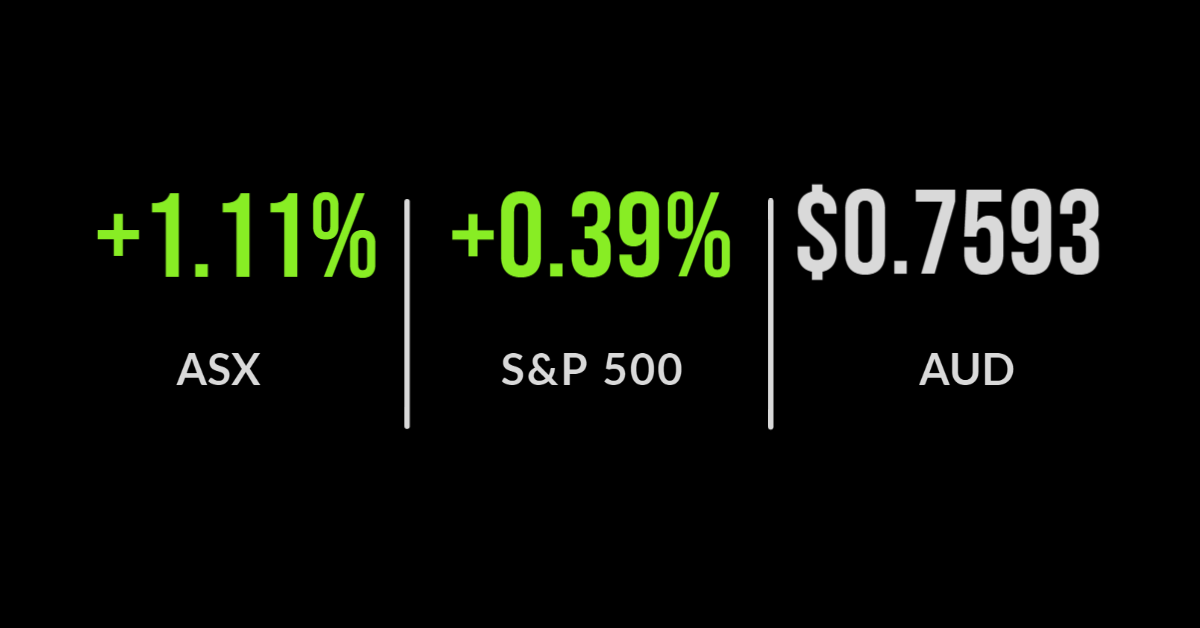Strongest week since November
Strongest week since November, News Corp (NWS) shows the evolution of media, more record highs
The ASX200 (ASX:XJO) finished the week the same way it started, moving 1.1% higher, with a broad-based recovery sending the index to its highest level in 11 months.
Mining services provider Worley (ASX:WOR) was the main laggard, falling 8.1% after flagging a significant fall in profit, whilst Afterpay (ASX:APT) hit another record high and Zip Co (ASX:Z1P) jumped 19.4% for the week despite a 4.1% fall in retail sales in December.
Yet on Friday it was News Corporation (ASX:NWS) leading the way, finishing 13.2% higher after delivering the most profitable quarter in seven years.
As the likes of Facebook and Google face regulatory pressure from every angle, NWS may well be an example of how media must evolve.
Revenue across the group fell 3% on the previous year to US$2.41 billion, but profit actually doubled to US$261 million on the back of a strong performance from the Dow Jones and Book Publishing businesses.
Dow Jones, which owns the Wall Street Journal and Barron’s, reported a 43% increase in earnings for the quarter, on the back of huge increases in digital subscriptions and advertising.
Similarly, book publishing earnings grew 65% and subscription video services, including Foxtel, increased 77% benefiting from lower sport rights and a recovery in streaming customers.
REA Group (ASX:REA) riding low rate boom, US markets pared gains but offer a strong open for the ASX
REA Group (ASX:REA) which owns the realestate.com.au website reached an all-time high on Friday, moving 1.6% higher after management reported a strong finish to 2020.
Despite a 2% fall in revenue to $430.4 million, profit increased 13% to $172.1 million with the CEO flagging that ‘property is on the March again’.
The profit growth was driven by a 13% reduction in costs, likely technology and staff driven, whilst traffic to their website increased 39% on 2019 levels, reaching an average of 12.3 million or half the Australian population per month.
US markets finished higher on Friday, the Nasdaq up 0.4% and the S&P500 0.3% despite weaker than expected weekly jobs data.
Over the week, the Nasdaq finished 6.0% higher and the S&P500 4.6% driven by a better-than-expected earnings season. Experts are now hoping bad news is good news, and this brings forward more stimulus payments.
Almost every sector was higher but electronic gaming developer Activision Blizzard (NASDAQ:ATVI) led the rest jumping 9.8% after reporting sustained growth in active users of the online games.
Well known titles Call of Duty and World of Warcraft (now 17 years old) saw the company report more than 100 million monthly active players on their titles. Call of Duty sales increased 40% on 2019 levels, as did World of Warcraft with both in-game and traditional sales adding 40%.
Don’t chase momentum, only one thing can stop big tech, bubble bubble toil and trouble
Shares in GameStop (NASDAQ:GME) finished around 80% lower over the week, burning those who decided to invest based on the headlines, trend and momentum that was feeding the day trading frenzy.
We have seen a number of these momentum rallies in recent years, lithium, cannabis and tiny tech companies, but this one is likely a reminder that ‘actual’ investors should focus on fundamentals, not headlines or momentum. The rule of losses never changes, with a 75% fall in value requiring a 300% gain just to breakeven.
News that Jeff Bezos would be stepping down as Amazon Inc. (NASDAQ:AMZN) surprised the market, but likely couldn’t have come at a better time.
The company, along with Google (NASDAQ:GOOGL) and Facebook (NASDAQ:FB) flexed their muscles once again with the pandemic further seeing another acceleration in revenue and profit, yet the one potential roadblock is gathering steam; regulators. Bezos steps down at a time when regulatory pressure is only beginning to step up around the globe.
BNPL players including Afterpay (ASX:APT) and Zip Co (ASX:Z1P) face a similar issue with the UK’s Financial Conduct Authority announcing it would be looking into the sector.
The RBA doubled down on QE this week despite saying just 18 months ago that the money printing policy wasn’t on their agenda.
Whilst the central bank is not concern about bubbles or inflation at this point, it is clear the market is, with the 10-year government bond rate increasing to over 1.2%, the opposite of what the QE policy intended.







